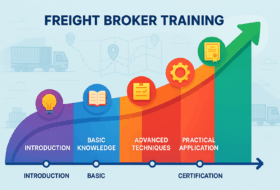A truck freight broker
A truck freight broker helps match manufacturing companies with trucking companies. A successful broker will be able to set up truck pick-ups and deliveries, maintain accurate shipping records and ensure that all freight arrives safely and on time. Many brokers work from home and have a list of customer contacts they can turn to when the need arises. If you enjoy working with people, possess project management skills, want to run your own business and have a basic understanding of transportation needs, consider becoming a truck freight broker.
Training
Like many careers, a potential freight broker may go to school and, after securing a job, discover that not everything can be taught in books. There’s no test to become a freight broker, but there are training courses. If a candidate takes one of these training courses, either in a community college setting — which usually offer courses sponsored by a group of area freight brokers — or online, the rising freight broker might land a job in a freight broker’s office. Once in the broker’s office, he learns the ins and outs of freight brokerage, including how to make up a full truckload of freight from several “less-than-truckload” shipments that have a common destination or destinations along a common route.
The fledgling broker can increase his chances of landing a position if he takes a course sponsored by a broker and gains his operating authority, or if he signs on as an agent with a brokerage after he receives his operating authority independently.
Becoming Registered
A freight broker needs to apply for a motor carrier number before applying to the Federal Motor Carrier Safety Administration, or FMCSA, for the “authority” to act as a broker. Once the motor carrier number is obtained and the application package is complete, the potential broker sends the registration pack to the FMCSA. Once the broker’s information is received and the broker receives approval from the FMCSA, the broker is registered with the federal government and the governments of the states in which the applicant has authority.
Designated Agents
Freight brokers have to designate one person in each state to which they may send loads or who may receive legal documents on their behalf. Such documents might include notices from public service commissions concerning changes in operating authority, changes in law or court documents, such as suit papers. The broker’s registered agent is also available to the public to pass messages to the broker or, in certain cases, to respond to and even resolve problems with shipments in which the broker is or was a participant.
The FMCSA is the federal regulatory agency that not only registers but also regulates freight brokers. Broker applicants are required to supply a $10,000 surety bond to the FMCSA to ensure that their performance in the practice of freight brokerage remains on the up-and-up. This gives the FMCSA the power to have the bond revoked and deprive the broker of a livelihood, if necessary, to enforce compliance with statutes affecting the motor carrier trade.





